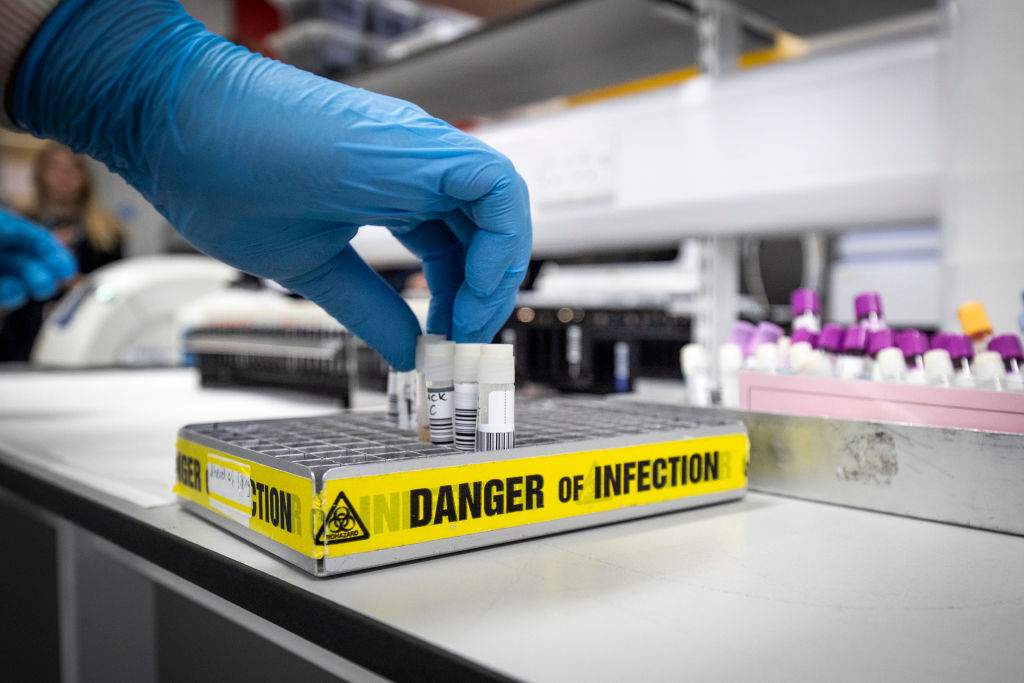WHO says deliberately infecting volunteers with coronavirus might accelerate vaccine development


A free daily email with the biggest news stories of the day – and the best features from TheWeek.com
You are now subscribed
Your newsletter sign-up was successful
The World Health Organization in a new report says intentionally infecting healthy volunteers with the coronavirus might accelerate the development of a vaccine.
A WHO working group outlined the potential benefits of human challenge studies in a report this week, per Bloomberg, saying that this process of infecting volunteers in order to test potential vaccines "can be substantially faster to conduct than vaccine field trials" and may "not only accelerate COVID-19 vaccine development, but also make it more likely that the vaccines ultimately deployed are more effective."
The report goes on to say that these "ethically sensitive" challenge studies must be "carefully designed and conducted in order to minimize harm to volunteers," although it notes that challenge studies for the COVID-19 coronavirus may be "thought to involve higher levels of risk and uncertainty" than others, especially given that "severe disease or death can occur in young adults." Initial studies should be limited to young volunteers between the ages of 18 and 30, WHO adds.
The Week
Escape your echo chamber. Get the facts behind the news, plus analysis from multiple perspectives.

Sign up for The Week's Free Newsletters
From our morning news briefing to a weekly Good News Newsletter, get the best of The Week delivered directly to your inbox.
From our morning news briefing to a weekly Good News Newsletter, get the best of The Week delivered directly to your inbox.
Peter G. Smith, who co-authored a Journal of Infectious Diseases article on this subject, has suggested that these challenge studies would be at least four months faster than standard trials, Quartz reports, though he noted that "even if a vaccine worked in young people, there would be no guarantee it would work in the same way for elderly people." The Journal of Infectious Diseases article, Quartz notes, says a larger study to determine how the vaccine works in other age and risk groups, which could take several months, should come after a challenge study.
Bloomberg also reports the the chief medical officer at Moderna, which is developing a coronavirus vaccine, recently cast doubt on whether challenge studies would speed up the process, saying, "As is often the case, the devil is in the details."
A free daily email with the biggest news stories of the day – and the best features from TheWeek.com
Brendan worked as a culture writer at The Week from 2018 to 2023, covering the entertainment industry, including film reviews, television recaps, awards season, the box office, major movie franchises and Hollywood gossip. He has written about film and television for outlets including Bloody Disgusting, Showbiz Cheat Sheet, Heavy and The Celebrity Cafe.
-
 How to Get to Heaven from Belfast: a ‘highly entertaining ride’
How to Get to Heaven from Belfast: a ‘highly entertaining ride’The Week Recommends Mystery-comedy from the creator of Derry Girls should be ‘your new binge-watch’
-
 The 8 best TV shows of the 1960s
The 8 best TV shows of the 1960sThe standout shows of this decade take viewers from outer space to the Wild West
-
 Microdramas are booming
Microdramas are boomingUnder the radar Scroll to watch a whole movie
-
 Trump HHS slashes advised child vaccinations
Trump HHS slashes advised child vaccinationsSpeed Read In a widely condemned move, the CDC will now recommend that children get vaccinated against 11 communicable diseases, not 17
-
 FDA OKs generic abortion pill, riling the right
FDA OKs generic abortion pill, riling the rightSpeed Read The drug in question is a generic version of mifepristone, used to carry out two-thirds of US abortions
-
 RFK Jr. vaccine panel advises restricting MMRV shot
RFK Jr. vaccine panel advises restricting MMRV shotSpeed Read The committee voted to restrict access to a childhood vaccine against chickenpox
-
 Texas declares end to measles outbreak
Texas declares end to measles outbreakSpeed Read The vaccine-preventable disease is still spreading in neighboring states, Mexico and Canada
-
 RFK Jr. shuts down mRNA vaccine funding at agency
RFK Jr. shuts down mRNA vaccine funding at agencySpeed Read The decision canceled or modified 22 projects, primarily for work on vaccines and therapeutics for respiratory viruses
-
 Measles cases surge to 33-year high
Measles cases surge to 33-year highSpeed Read The infection was declared eliminated from the US in 2000 but has seen a resurgence amid vaccine hesitancy
-
 Kennedy's vaccine panel signals skepticism, change
Kennedy's vaccine panel signals skepticism, changeSpeed Read RFK Jr.'s new vaccine advisory board intends to make changes to the decades-old US immunization system
-
 Kennedy ousts entire CDC vaccine advisory panel
Kennedy ousts entire CDC vaccine advisory panelspeed read Health Secretary RFK Jr. is a longtime anti-vaccine activist who has criticized the panel of experts
